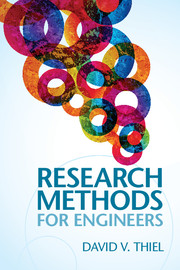Book contents
- Frontmatter
- Contents
- Preface
- An introductory note for instructors
- 1 Introduction to engineering research
- 2 Literature search and review
- 3 Developing a research plan
- 4 Statistical analysis
- 5 Optimization techniques
- 6 Survey research methods
- 7 Research presentation
- 8 The path forward
- Appendix A: Matlab plot functions
- Appendix B: Excel plot functions
- Index
- References
1 - Introduction to engineering research
Published online by Cambridge University Press: 05 September 2014
- Frontmatter
- Contents
- Preface
- An introductory note for instructors
- 1 Introduction to engineering research
- 2 Literature search and review
- 3 Developing a research plan
- 4 Statistical analysis
- 5 Optimization techniques
- 6 Survey research methods
- 7 Research presentation
- 8 The path forward
- Appendix A: Matlab plot functions
- Appendix B: Excel plot functions
- Index
- References
Summary
Why engineering research?
The disciplines of engineering are all described as the application of science to realistic systems which benefit humankind [1]. Engineering research is therefore based on the principles of scientific research which, in turn, are based on the scientific method, in which observations (experiments), theories, calculations and models are derived from the existing body of scientific knowledge and verified independently by others who are experts in the field [2–4]. This latter process is called ‘peer review’. While this formal review by peers is not foolproof, it constitutes the best method of validation and verification of research results. Engineering research is based on precisely the same scientific method; however, the research is directed toward the practical application of science to products, services and infrastructure.
Most research starts with a hypothesis; that is, a statement which can be either proved or disproved. In most cases it is easier to disprove a hypothesis because only one counter example is required to discredit the idea. To prove a hypothesis, it is necessary to exhaustively examine every possible case and make sure the hypothesis applies. Often this results in the creation of limiting conditions. The conclusion becomes slightly modified in that the hypothesis is valid providing certain conditions are met. A full evaluation of a hypothesis may take many years without a conclusive resolution.
Information
- Type
- Chapter
- Information
- Research Methods for Engineers , pp. 1 - 26Publisher: Cambridge University PressPrint publication year: 2014
